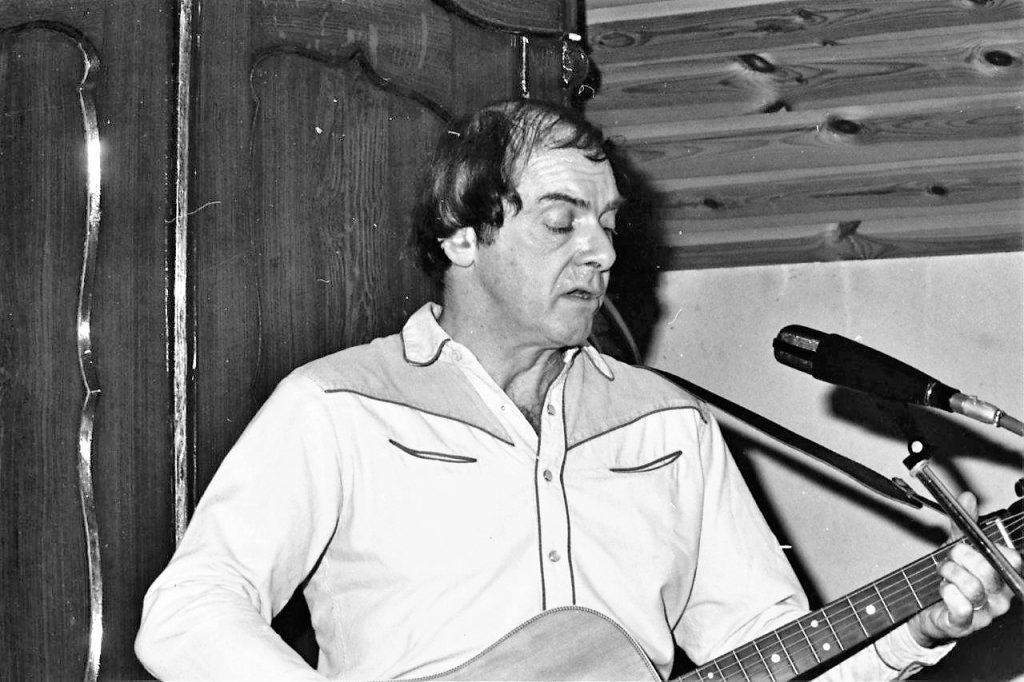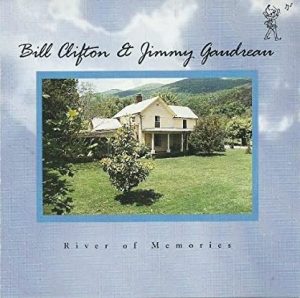Voortvarend waren Kees Jansen, Bert Nobbe en ik van start gegaan met het uitwerken van onze plannen. Vragen werden bedacht en in een soort van systematische en chronologische volgorde gezet. Kees nam de taak op zich om de opgenomen teksten uit te tikken (een transcriptie te maken). Het eerste gesprek met Bill Clifton vond plaats in Nieuwe Pekela. Justin Rissler (Bill Clifton’s kleinzoon) was ook aanwezig. Tijdens het gesprek met Bill maakte hij verscheidene foto’s. Kees Jansen heeft uiteindelijk 4 CD’s gemaakt met daar de opnamen van destijds. Ik heb ervoor gekozen om deze opnamen per track uit te werken. Een uit zichzelf startende MP3 van de desbetreffende track met daaronder de transcriptie van destijds. Onze vragen heb ik rood gekleurd, de antwoorden van Bill Clifton zijn standaard in zwart weergegeven. In totaal zijn er circa 40 MP3’s op de vier CD’s terug te vinden, we kunnen dus even vooruit…
After the Carter Family conference
Transcriptie:
It is about two years ago that we met in London for the Carter Family Conference. First of all, we will get back to the conference a bit later, but what did you do in the meantime? What did I do in the meantime? Well, occasional tours but mainly we had a lot of problems with flooding back home. And we had another… Our first big flood was in 2002, before that conference, and then the next one came in November 2003. And so we just had a lot of work to do around the place. But musically speaking I’ve not done much except a few festivals and a tour of Japan, which was my fifth and probably last tour that I will do in Japan. But it was a wonderful tour, very exhausting. The Japanese are extremely warm and friendly people who look after your every need, and they are a little bit like blotters: they absorb everything you say, and they want to know everything and so its… It’s always nice to go there but it’s also very tiring. After two weeks you’re ready to just lay down and go to sleep for a month, you know. And that was the last tour I did, I guess, and …
Which people did you bring along on that tour? Oh, I went as a soloist. I just worked as a soloist, and I do both in Japan like I do in Holland. I do both almost everywhere except America. I very rarely get asked to perform as a soloist in America. I started as a soloist. In 1950 I started in radio in March, March of 1950 I guess was the first radio program. At the age of 18, or whatever I was in 1950, I worked as a soloist and it was only after I met Johnny Clark, who was playing Scruggs style banjo, in 1952 that I started forming a band and did form a band around that. But I still like working as a soloist and there are a lot of songs that I can sing as a soloist that I really find not suitable for bands. And there are a lot of things I do with the band that are really not suitable for solo work. So, you know, it depends on what material you do but I like doing all that material because it’s all old material that, I think, needs to be sung. So sometimes I can do them as a soloist, and I can’t do them in a band form. Or I can do them as a duet, with one other person. And I like doing that too. After Red Rector died, I don’t do so much of that. But Raymond McClain has been doing some things with me and Jimmy Gaudreau has been doing some things with me in a duet format. And Hedy West and I used to do it years ago. I like all forms of playing the music and there’s so many songs that suit one format and they don’t suit another one. So, I like doing it all ways. But when I go to Japan I work sometimes with a group, sometimes as a soloist. And the last one I did will probably be the last tour I do there. It was a solo tour, and it was wonderful, but it was also very exhausting, I guess I would say, more than anything else. So musically I haven’t done that much. Yeah, I’ve made a new recording. I guess that was thanks to Art Stamper. And if Art Stamper hadn’t wanted to do another recording with Jimmy Gaudreau and myself, I probably would not have done that one as soon as I did or maybe never. But I’m glad we did it.

 You don’t plan your recordings in advance? Like: ‘I’ll do one I reckon every two years, or three years?’ No, I don’t have any plans for them. I mean I… the only record I really wanted to put out in the last fifteen years, I guess, really was that ‘River of Memories’ album. And a person, who shall remain nameless, who owned a record company asked me if I would record an album of gospel music or inspirational music years and years ago. And I went to work on that, and I told him ‘yes’ and I then I went to work on that. I was living in England at the time, and I took some time to bring the material together that I really wanted to do. Then I called him up and he said: ‘Too late. I’ve sold the record company and I’m moving to Hawaii’. Okay…
You don’t plan your recordings in advance? Like: ‘I’ll do one I reckon every two years, or three years?’ No, I don’t have any plans for them. I mean I… the only record I really wanted to put out in the last fifteen years, I guess, really was that ‘River of Memories’ album. And a person, who shall remain nameless, who owned a record company asked me if I would record an album of gospel music or inspirational music years and years ago. And I went to work on that, and I told him ‘yes’ and I then I went to work on that. I was living in England at the time, and I took some time to bring the material together that I really wanted to do. Then I called him up and he said: ‘Too late. I’ve sold the record company and I’m moving to Hawaii’. Okay…
I read that story in the book. The book, which was in the Bear Family box. Was that the guy who started? Can you mention his name; I read that in the book? It was in that book. Was it? I don’t remember that.
Was that the head of Starday? Well, if you really insist on knowing who it was. I can’t even think of his name now. But he owned, he started a company called Rebel Records.
Freeman? Yeah, Freeland (sic). And I never had any relationship with him. John Duffy always liked him, and John always said: ‘You should do a record for Dick Freeland (sic) on Rebel’. So at some point we talked about doing this, doing an inspirational album. And I thought: ‘Well, if he wants to do that then I’ll do THAT, you know’. And then, when I finally got the material together, which took me about a year: thinking about it and how I wanted to do it, he sold the record company. And that was that. So, okay...

Dit word een Methusalem klus Harry, moar wat zugt het er goud oet!! Eigenlijk motten ze van dit in de VS een Podcast van moaken. Loat de zeunen van Petra doar moar eem over kopstoeien (Bluegrass Unlimited?). Ik bedoel allenig moar dat dit eigenlijk groter vastlegd worden mot! Good luck!
Ik maak vooral dankbaar gebruik van het werk dat Kees Jansen jaren geleden al gedaan heeft (op een CD branden en uittikken). Ben het volledig met je eens dat het vastgelegd moet worden, daar is nu een begin mee gemaakt, en daar heb ik geen spijt van. Ik ga ondertussen gewoon lekker door met knutselen…